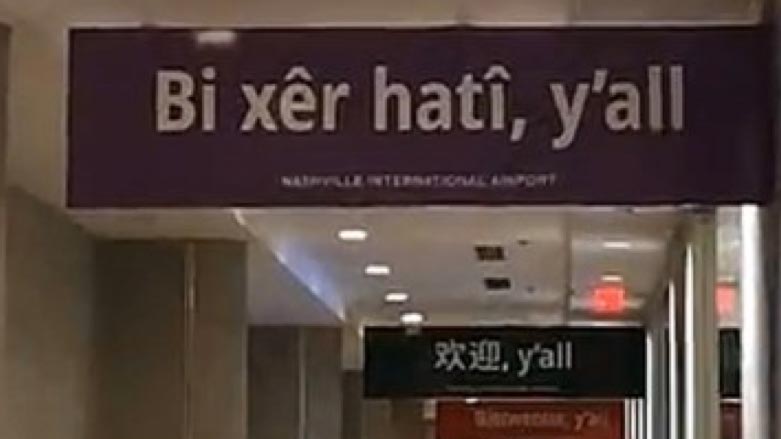KRG welcomes Nashville’s recognition of Kurdish-Americans
“The Kurdish-Americans who have made Nashville their home for the past five decades have made great contributions to the city’s economy, as well as its social and cultural life," the KRG Representative in Washington said.

WASHINGTON DC, United States (Kurdistan 24) – On Saturday, Nashville, Tennessee will honor its relationship with American Kurds and the contribution they have made to the life of the city.
The Kurdistan Regional Government (KRG) Representation in Washington formally announced this on Friday, explaining that Nashville “will unveil a historical marker to recognize the contributions and significance of the Kurdish community to the city’s history and culture.”
“We commend the people and government of Nashville for what we believe to be the first historical marker in North America to recognize the Kurdish diaspora,” Bayan Sami Abdul Rahman, the KRG Representative in Washington said in a written statement.
“The Kurdish-Americans, who have made Nashville their home for the past five decade, have made great contributions to the city’s economy, as well as its social and cultural life,” she said.
Kurdish Immigration to Nashville
Nashville is home to more Kurds than any other US city. Some 20,000 now live in the Nashville area, as Dilman Yasseen, a Kurdish community organizer, who also works for the city government, told Kurdistan 24.
Although some Kurds came to Nashville in the 1970s, Yasseen explained, the bulk came in the early 1990s. That was in the wake of the 1991 Gulf War, when the US led a coalition that drove Saddam Hussein out of Kuwait—but ended that war with Saddam still in power, and then watched, as he ruthlessly suppressed the post-war popular uprisings.
Read More: The US Watches, as Saddam Crushes the Uprisings: 25th Anniversary
President George H. W. Bush had been told that after such a stunning defeat, Saddam would be overthrown in a military coup. But the uprisings had interfered with the coup, Iraqi experts said, so Bush should let Saddam suppress them—and the coup would follow.
It was a cruel and horrible blunder, and it was corrected only after Secretary of State James Baker visited the Turkish-Iraqi border and saw the terrible situation: almost the entire population of the Kurdistan Region had fled to the borders, fearing a chemical attack from Saddam’s forces.
His visit precipitated a dramatic change in US policy, as Baker explained in a webinar hosted by the KRG Representation in Washington on the 30th anniversary of Operation Provide Comfort (OPC.) OPC brought the Kurdish people back to their homes and laid the foundation for Kurdish self-rule a decade later, after Saddam was overthrown, as the long-time Kurdish leader, Masoud Barzani, explained in the same webinar.
Read More: Masoud Barzani hails Operation Provide Comfort, even as he warns of current dangers
Kurdish Contribution to Nashville
“The first generation of Kurds who arrived in Nashville brought with them resilience, hope, and courage as they integrated into a new culture,” Abdul Rahman explained. “They and the second and third generations are now contributing to the city’s economic and professional development.”
“We are proud of the Kurdish-American diaspora in Nashville and across the United States and Canada and congratulate them on overcoming the struggles that all immigrant communities face and applaud them for their successes,” she concluded.